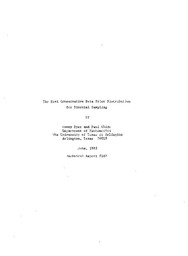
ATTENTION: The works hosted here are being migrated to a new repository that will consolidate resources, improve discoverability, and better show UTA's research impact on the global community. We will update authors as the migration progresses. Please see MavMatrix for more information.
Show simple item record
| dc.contributor.author | Chiou, Paul | en |
| dc.contributor.author | Dyer, Danny D. | en |
| dc.date.accessioned | 2010-06-03T18:21:48Z | en |
| dc.date.available | 2010-06-03T18:21:48Z | en |
| dc.date.issued | 1982-06 | en |
| dc.identifier.uri | http://hdl.handle.net/10106/2349 | en |
| dc.description.abstract | **Please note that the full text is embargoed** ABSTRACT: The incorporation of prior information about a parameter into a statistical
procedure is an essential feature of Bayesian statistics. However, the manner in which this is done is often arbitrary. In order to reduce such arbitrariness, methodology based on information theoretic concepts is introduced which (a) quantifies the amount of information provided by the sample data relative
to that provided by the prior distribution and (b) allows for a ranking of prior distributions with respect to conservativeness, where conservatism refers to restraint of extraneous information which is embedded in any prior distribution
of the parameter. To illustrate the implementation of the methodology, the most conservative beta prior distribution under a binomial sampling model
is determined for three situations: (1) no prior estimate of ^, where ^ is the success probability, is available, (2) a prior point estimate of ^ is available, and (3) a prior interval estimate of ^ is available. | en |
| dc.language.iso | en_US | en |
| dc.publisher | University of Texas at Arlington | en |
| dc.relation.ispartofseries | Technical Report;187 | en |
| dc.subject | Conservative prior distribution | en |
| dc.subject | Reliability of series system | en |
| dc.subject | Information theory | en |
| dc.subject | Ranking of prior distributions | en |
| dc.subject.lcsh | Bayesian statistical decision theory | en |
| dc.subject.lcsh | Statistics | en |
| dc.subject.lcsh | Mathematics Research | en |
| dc.title | The Most Conservative Beta Prior Distribution for Binomial Sampling | en |
| dc.type | Technical Report | en |
| dc.publisher.department | Department of Mathematics | en |
Files in this item
- Name:
- MathTechReport187.pdf
- Size:
- 835.2Kb
- Format:
- PDF
- Description:
- PDF
This item appears in the following Collection(s)
Show simple item record


